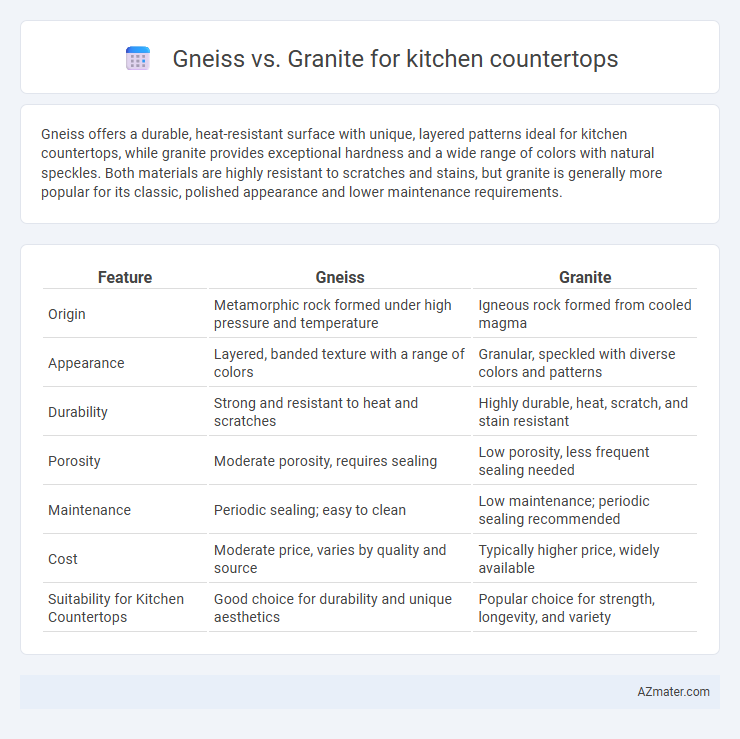Gneiss offers a durable, heat-resistant surface with unique, layered patterns ideal for kitchen countertops, while granite provides exceptional hardness and a wide range of colors with natural speckles. Both materials are highly resistant to scratches and stains, but granite is generally more popular for its classic, polished appearance and lower maintenance requirements.
Table of Comparison
| Feature | Gneiss | Granite |
|---|---|---|
| Origin | Metamorphic rock formed under high pressure and temperature | Igneous rock formed from cooled magma |
| Appearance | Layered, banded texture with a range of colors | Granular, speckled with diverse colors and patterns |
| Durability | Strong and resistant to heat and scratches | Highly durable, heat, scratch, and stain resistant |
| Porosity | Moderate porosity, requires sealing | Low porosity, less frequent sealing needed |
| Maintenance | Periodic sealing; easy to clean | Low maintenance; periodic sealing recommended |
| Cost | Moderate price, varies by quality and source | Typically higher price, widely available |
| Suitability for Kitchen Countertops | Good choice for durability and unique aesthetics | Popular choice for strength, longevity, and variety |
Introduction to Gneiss and Granite Countertops
Gneiss and granite are popular choices for kitchen countertops due to their durability and unique aesthetic appeal. Gneiss features distinctive banded patterns formed under high-pressure metamorphic conditions, providing a layered, elegant look, while granite is an igneous rock known for its consistent grain and wide range of colors. Both materials offer excellent resistance to heat, scratches, and stains, making them ideal for high-traffic kitchen environments.
Geological Differences: Gneiss vs Granite
Gneiss and granite differ significantly in their geological formation and mineral composition, impacting their kitchen countertop suitability. Gneiss is a metamorphic rock characterized by its foliated texture, formed under high pressure and temperature conditions that realign minerals into bands, giving it a distinctive layered appearance. Granite is an igneous rock composed mainly of quartz, feldspar, and mica, crystallized from molten magma, resulting in a more uniform, granular texture with high durability and resistance to heat and scratches.
Appearance and Color Variations
Gneiss countertops display a unique banded or foliated texture with a mix of light and dark minerals, offering a dynamic and natural appearance that is distinct from granite. Granite features more uniform grain patterns and a wide range of colors including black, white, pink, and green, making it highly versatile for different kitchen designs. Both stones provide durable surfaces, but gneiss tends to emphasize contrasting layers, while granite offers smoother color transitions and consistent speckling.
Durability and Hardness Comparison
Gneiss exhibits high durability and hardness due to its foliated structure and quartz content, making it resistant to scratches and heat ideal for kitchen countertops. Granite, composed primarily of quartz, feldspar, and mica, is equally durable with excellent diamond hardness ratings that prevent chipping and cracking under heavy use. Both stones offer superior longevity, but granite is slightly more prevalent in countertops for its consistent hardness and ease of maintenance.
Maintenance Requirements
Gneiss countertops require moderate maintenance, including regular sealing to prevent moisture penetration and staining due to its natural foliation, which can harbor dirt and spills. Granite countertops offer high durability with less frequent sealing, as their dense, non-foliated structure resists stains and scratches more effectively, making them easier to maintain over time. Proper cleaning with pH-balanced products is essential for both materials to preserve their surface integrity and appearance.
Resistance to Heat, Stains, and Scratches
Gneiss countertops offer excellent resistance to heat and scratches due to their metamorphic formation, making them durable for kitchen use. Granite is also highly heat-resistant and less prone to stains when properly sealed, but it can be slightly more vulnerable to scratches compared to gneiss. Both materials provide strong durability, though granite requires more maintenance to preserve its stain-resistant properties.
Cost Comparison: Gneiss vs Granite
Gneiss countertops typically cost between $50 and $100 per square foot, making them a more affordable option compared to granite, which ranges from $60 to $120 per square foot depending on quality and origin. Installation and maintenance expenses for both materials are similar, but granite's higher price often reflects its greater availability and variety of patterns. For budget-conscious kitchen remodels, gneiss offers a cost-effective alternative without compromising durability or aesthetic appeal.
Installation Process and Considerations
Gneiss countertops require precise cutting and sealing due to their foliated texture, which can complicate installation compared to granite. Granite offers greater ease in fabrication and installation, benefiting from its uniform grain and higher durability against heat and scratches. Both materials necessitate professional handling, but granite's consistency typically reduces installation time and post-install maintenance.
Sustainability and Eco-Friendliness
Gneiss and granite are both natural stones valued for kitchen countertops, but gneiss often exhibits better sustainability due to its typically local sourcing and less intensive quarrying processes, which reduce environmental impact. Granite extraction can involve significant quarrying energy and water use, whereas gneiss's metamorphic formation usually means fewer chemical treatments are needed, enhancing eco-friendliness. Both materials offer durability and longevity, minimizing replacement frequency and waste, but gneiss's lower environmental footprint makes it a more sustainable choice for eco-conscious kitchens.
Which is Better for Your Kitchen: Gneiss or Granite?
Granite offers superior durability and heat resistance, making it a popular choice for high-traffic kitchen countertops, while gneiss provides a unique textured appearance with layered mineral compositions that can add aesthetic value. Both stones are hard and durable, but granite generally requires less maintenance due to its lower porosity, reducing the risk of staining and bacterial absorption. For kitchens prioritizing lasting performance and easy upkeep, granite is often considered the better option, whereas gneiss appeals to those seeking distinctive natural patterns.

Infographic: Gneiss vs Granite for Kitchen countertop
 azmater.com
azmater.com